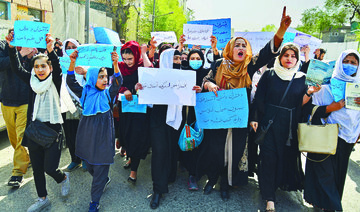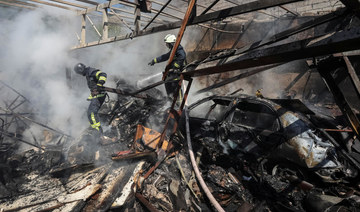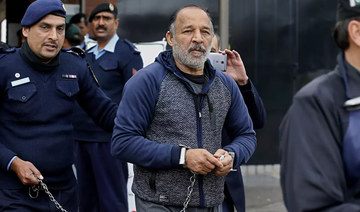KABUL: For most teenage girls in Afghanistan, it’s been a year since they set foot in a classroom. With no sign the ruling Taliban will allow them back to school, some are trying to find ways to keep education from stalling for a generation of young women.
At a house in Kabul, dozens gathered on a recent day for classes in an informal school set up by Sodaba Nazhand. She and her sister teach English, science and math to girls who should be in secondary school.
“When the Taliban wanted to take away the rights of education and the rights of work from women, I wanted to stand against their decision by teaching these girls,” Nazhand said.
Hers is one of a number of underground schools in operation since the Taliban took over the country a year ago and banned girls from continuing their education past the sixth grade. While the Taliban have permitted women to continue attending universities, this exception will become irrelevant when there are no more girls graduating from high schools.
“There is no way to fill this gap, and this situation is very sad and concerning,” Nazhand said.
The relief agency Save the Children interviewed nearly 1,700 boys and girls between the ages of 9 and 17 in seven provinces to assess the impact of the education restrictions.
The survey, conducted in May and June and released Wednesday, found that more than 45 percent of girls are not going to school, compared with 20 percent of boys. It also found that 26 percent of girls are showing signs of depression, compared with 16 percent of boys.
Nearly the entire population of Afghanistan was thrown into poverty and millions were left unable to feed their families when the world cut off financing in response to the Taliban takeover.
Teachers, parents and experts all warn that the country’s multiple crises, including the devastating collapse of the economy, are proving especially damaging to girls. The Taliban have restricted women’s work, encouraged them to stay at home and issued dress codes requiring them to cover their faces, except for their eyes, though the codes are not always enforced.
The international community is demanding that the Taliban open schools for all girls, and the US and EU have created plans to pay salaries directly to Afghanistan’s teachers, keeping the sector going without putting the funds through the Taliban.
But the question of girls’ education appears to have been tangled in behind-the-scenes differences among the Taliban. Some in the movement support returning girls to school — whether because they see no religious objection to it or because they want to improve ties with the world. Others, especially rural, tribal elders who make up the backbone of the movement, staunchly oppose it.
During their first time ruling Afghanistan in the 1990s, the Taliban imposed much stricter restrictions on women, banning school for all girls, barring women from work and requiring them to wear an all-encompassing burka if they went outside.
In the 20 years after the Taliban were driven from power in 2001, an entire generation of women returned to school and work, particularly in urban areas. Seemingly acknowledging those changes, the Taliban reassured Afghans when they seized control again last year that they would not return to the heavy hand of the past.
Officials have publicly insisted that they will allow teen girls back into school, but say time is needed to set up logistics for strict gender segregation to ensure an “Islamic framework.”
Hopes were raised in March: Just before the new school year was to begin, the Taliban Education Ministry proclaimed everyone would be allowed back. But on March 23, the day of the reopening, the decision was suddenly reversed, surprising even ministry officials. It appeared that at the last minute, the Taliban’s supreme leader, Mullah Haibatullah Akhundzada, bowed to the opposition.
Underground schools present an alternative, though with limitations.
A month after the Taliban takeover, Nazhand started teaching street children to read with informal outdoor classes in a park in her neighborhood. Women who couldn’t read or write joined them, she said.
Some time later, a benefactor who saw her in the park rented a house for her to hold classes in, and bought tables and chairs. Once she was operating inside, Nazhand included teen girls who were no longer allowed to go to public school.
Now there are about 250 students, including 50 or 60 schoolgirls above sixth grade.
“I am not only teaching them school subjects, but also trying to teach them how to fight and stand for their rights,” Nazhand said.
The Taliban haven’t changed from their first time in power in the late 1990s, she said. “These are the same Taliban, but we shouldn’t be the same women of those years. We must struggle: by writing, by raising our voice, by any way possible.”
Nazhand’s school, and others like it, are technically illegal under the Taliban’s current restrictions, but so far they haven’t shut hers down. At least one other person operating a school declined to speak to reporters, however, fearing possible repercussions.
Despite her unwavering commitment, Nazhand worries about her school’s future. Her benefactor paid for six months’ rent on the house, but he died recently, and she doesn’t have any way to keep paying for rent or supplies.
For students, the underground schools are a lifeline.
“It is so hard when you can’t go to school,” said one of them, Dunya Arbabzada. “Whenever I pass by my school and see the closed door ... it’s so upsetting for me.”
Afghan girls face uncertain future one year after Taliban school ban
https://arab.news/pptjp
Afghan girls face uncertain future one year after Taliban school ban
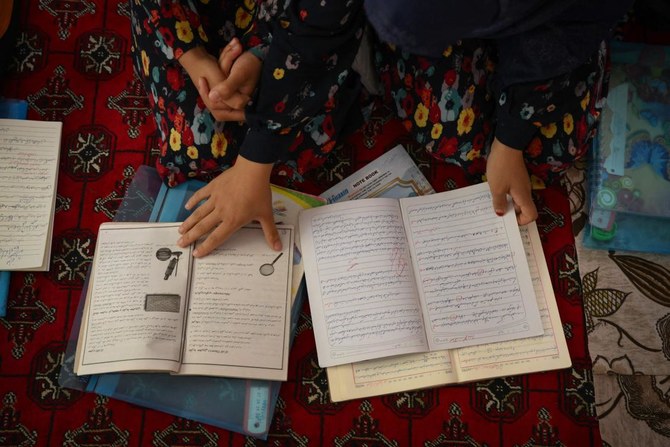
- Some are trying to find ways to keep education from stalling for a generation of young women
- Underground schools present an alternative, though with limitations
Drone footage shows devastation in Ukraine’s strategic eastern city of Chasiv Yar as Russians near
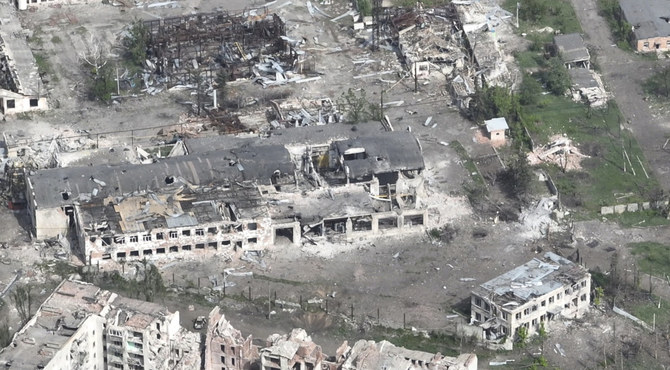
- The destruction is reminiscent of the cities of Bakhmut and Avdiivka, which Ukraine yielded after months of bombardment and huge losses for both sides
- Russia launched waves of assaults against Chasiv Yar’s outnumbered defenders as Ukraine's US and European allies dilly-dallied on sending fresh supplies
KYIV, Ukraine: Months of relentless Russian artillery pounding have devastated a strategic city in eastern Ukraine, new drone footage obtained by The Associated Press shows, with barely a building left intact, homes and municipal offices charred and a town that once had a population of 12,000 now all but deserted.
The footage shows Chasiv Yar — set amid green fields and woodland — pounded into an apocalyptic vista. The destruction is reminiscent of the cities of Bakhmut and Avdiivka, which Ukraine yielded after months of bombardment and huge losses for both sides.
The strategically important city has been under attack by Russian forces for months. Capturing it would give Russia control of a hilltop from which it can attack other cities that form the backbone of Ukraine’s eastern defenses.
That would set the stage for a potentially broader Russian offensive that Ukrainian officials say could come as early as this month.
Russia launched waves of assaults on foot and in armored vehicles at Chasiv Yar’s outnumbered Ukrainian troops, who have run desperately short of ammunition while waiting for the US and other allies to send fresh supplies.
Rows of mid-rise apartment blocks in Chasiv Yar have been blackened by blasts, punched through with holes or reduced to piles of timber and masonry. Houses and civic buildings are heavily damaged. The golden dome of a church remains intact but the building appears badly damaged.
No soldiers or civilians were seen in the footage shot Monday and exclusively obtained by the AP, apart from a lone man walking down the middle of a road between wrecked structures.
Regional Gov. Vadym Filashkin said Wednesday on Ukrainian TV that 682 residents have held on in Chasiv Yar, living in “very difficult conditions.” The city had a pre-war population of over 12,500. Filashkin said that those remaining have lacked running water and power for over a year, and that it is “ever more difficult” for humanitarian aid to reach them.
The destruction underscores Russia’s scorched-earth tactics throughout more than two years of war, as its troops have killed and displaced thousands of civilians.
NATO Secretary-General Jens Stoltenberg acknowledged Monday that the delayed delivery of allies’ military aid to Ukraine had left the country at the mercy of the Kremlin’s bigger and better-equipped forces.
Ukraine and its Western partners are racing to deploy critical new military aid that can help check the slow but steady Russian advance as well as thwart drone and missile attacks.
Elsewhere, Ukrainian authorities reported that two civilians died and at least nine others, included an 11-year-old boy, were wounded Wednesday after Russian aerial guided bombs pummeled a village in the northeastern Kharkiv region.
According to Gov. Oleh Syniehubov, a 64-year-old man and 38-year-old woman — both locals — were killed after one of the bombs detonated near their car in Zolochiv, some 20 kilometers (12 miles) from the border with Russia.
In the southern Black Sea port of Odesa, at least 13 people were wounded after a Russian ballistic missile slammed into the city late Wednesday, regional Gov. Oleh Kiper said in a Telegram update. He did not say what had been hit, but reported the blast had sparked a major fire.
Videos circulating on social media showed huge plumes of smoke rising skywards at the site. Nova Poshta, a large Ukrainian postal and courier company, said in a Facebook post Wednesday that one of its sorting depots had been struck, but claimed no employees were among those hurt.
Odesa has been a frequent target for Russian firepower, with eight civilians killed by Russian missiles in the city over the past two days.
UK police officer charged with showing support for Hamas

- Mohammed Adil, from Bradford in northern England, was arrested last November and charged following an investigation
- Adil, a police constable, has been suspended from his job with West Yorkshire Police and is due to appear in court on Thursday
LONDON: A British police officer has been charged with a terrorism offense for allegedly publishing an image in support of Hamas, a group banned in Britain as a terrorist organization, police said on Wednesday.
Mohammed Adil, 26, from Bradford in northern England, was arrested last November and charged following an investigation by British counter-terrorism officers, Counter Terrorism Policing North East said in a statement.
The police watchdog, the Independent Office for Police Conduct (IOPC), said the inquiries had focused on messages shared on WhatsApp which had concluded the case should be referred to prosecutors.
“On Monday, PC Mohammed Adil, 26, was charged with two counts of publishing an image in support of a proscribed organization, specifically Hamas, contrary to section 13 of the Terrorism Act,” the IOPC statement said. “The offenses are alleged to have taken place in October and November 2023.”
Adil, a police constable, has been suspended from his job with West Yorkshire Police and is due to appear before London Westminster Magistrates’ Court on Thursday.
Since the Oct. 7 attacks by Hamas on Israel, police have arrested and charged a number of people at pro-Palestinian protests in London for showing support for the group, while counter-terrorism commanders say they have also had a large amount of online content referred to them.
Family of 7-year-old girl trampled on boat while crossing Channel feared repatriation to Iraq

- Sara Alhashimi was crushed to death when a large group of men rushed onto an overloaded inflatable dinghy she had boarded with her parents and 2 siblings
- Her father says his family was told they were to be deported to his home country of Iraq after living in Europe for 14 years
LONDON: A seven-year-old Iraqi girl was crushed to death in a small, overcrowded boat as her family, who feared repatriation to Iraq after years living in Europe, attempted to cross the English Channel from France to the UK, the Guardian reported on Wednesday.
Sara Alhashimi was with her father Ahmed Alhashimi, mother Nour Al-Saeed, 13-year-old sister Rahaf and 8-year-old brother Hussam when they boarded an inflatable dinghy at Wimereux, south of Calais, last Tuesday.
But Alhashimi, 41, said that as it set sail, a large group of men rushed onboard and he lost his grip on his daughter. Unable to move because of the crush, he could not reach her and she was trampled. Four other people also died.
Alhashimi said he left Basra around 2010 after he was threatened by an armed group. Sara, his youngest child, was born in Belgium. The family had also lived in Sweden and submitted asylum applications to several EU countries but all were rejected. Their attempt to cross the channel last week was their fourth in two months since arriving in the Pas de Calais region, after police prevented the previous crossings.
Alhashimi told the BBC: “If I knew there was a 1 percent chance that I could keep the kids in Belgium or France or Sweden or Finland I would keep them there.
“All I wanted was for my kids to go to school. I didn’t want any assistance. My wife and I can work. I just wanted to protect them and their childhoods and their dignity.”
Smugglers promised a guaranteed place on a boat carrying 40 migrants for €1,500 ($1,600) per adult and €750 per child, Alhashimi said.
Sara was calm, he added, as he held her hand while they walked from a railway station and then hid in dunes overnight while waiting to board their vessel. The smugglers told the group to inflate the boat shortly before 6 a.m., carry it toward the shore and run as they approached the water.
As they did so, however, a teargas canister thrown by police went off beside them, Alhashimi said, and Sara began to scream. He had been carrying her on his shoulders but once inside the dinghy he put her down so he could help daughter Rahaf get onboard.
As he tried to reach Sara in the increasingly overcrowded boat, Alhashimi said he begged a Sudanese man, who had joined them at the last minute, to get out of the way. He even punched the man, with little effect.
“I just wanted him to move so I could pull my baby up,” he said. “That time was like death itself … We saw people dying. I saw how those men were behaving. They didn’t care who they were stepping on — a child, or someone’s head, young or old. People started to suffocate.
“I could not protect her. I will never forgive myself. But the sea was the only choice I had.”
Alhashimi said was only able to reach Sara after French rescuers had arrived at the boat and removed some of the 112 people onboard.
“I saw her head in the corner of the boat,” he said. “She was all blue. She was dead when we pulled her out. She wasn’t breathing.”
Belgium recently rejected an asylum claim by the family on the grounds that Basra was a safe place for them to return to. They had spent the past seven years living with a friend in Sweden.
“Everything that happened was against my will,” said Alhashimi. “I ran out of options. People blame me and say, ‘how could I risk my daughters?’ But I’ve spent 14 years in Europe and have been rejected.”
Colombia to cut diplomatic ties with Israel

- “Tomorrow (Thursday) diplomatic relations with the state of Israel will be severed... for having a genocidal president,” Petro told a May Day rally in Bogota
- Petro, Colombia’s first leftist president, has also asserted that “democratic peoples cannot allow Nazism to reestablish itself in international politics“
BOGOTA: Colombian President Gustavo Petro said Wednesday his country will sever diplomatic ties with Israel, whose leader he described as “genocidal” over its war in Gaza.
“Tomorrow (Thursday) diplomatic relations with the state of Israel will be severed... for having a genocidal president,” Petro, a harsh critic of the devastating war against Hamas, told a May Day rally in Bogota.
Petro has taken a critical stance on the Gaza assault that followed an unprecedented Hamas attack on southern Israel on October 7 — which resulted in the deaths of some 1,170 people, mostly civilians, according to Israeli figures.
In October, just days after the start of the war, Israel said it was “halting security exports” to Colombia after Petro accused Israeli Defense Minister Yoav Gallant of using language about the people of Gaza similar to what the “Nazis said of the Jews.”
Petro, Colombia’s first leftist president, has also asserted that “democratic peoples cannot allow Nazism to reestablish itself in international politics.”
In February, Petro suspended Israeli weapons purchases after dozens of people died in a scramble for food aid in the war-torn Palestinian territory — an event he said “is called genocide and recalls the Holocaust.”
In the October attack, Hamas militants also took about 250 hostages, 129 of whom remain in Gaza, including 34 Israel says are presumed dead.
Israel’s retaliatory offensive has killed at least 34,568 people in Gaza, mostly women and children, according to the health ministry in the Hamas-run territory.
UK auction house removes Egyptian skulls from sale after outcry

- Lawmaker condemns trade as ‘gross violation of human dignity’
- Items were part of collection owned by English archaeologist Augustus Pitt Rivers
LONDON: A UK auction house has removed 18 ancient Egyptian human skulls from sale amid condemnation by a member of Parliament, The Guardian reported.
Labour MP Bell Ribeiro-Addy said the sale of human remains for any purpose should be outlawed and described the trade as a “gross violation of human dignity.”
Semley Auctioneers in Dorset had listed the skulls with a guide price of £200-£300 ($250-$374) for each lot. The collection included 10 male skulls, five female and three of an uncertain sex.
Some of the skulls were listed as coming from Thebes and dating back to 1550 B.C.
They were originally collected by Augustus Henry Lane Fox Pitt Rivers, an English soldier and archaeologist who established the Pitt Rivers Museum in Oxford, which contains about 22,000 items.
After being housed at a separate private museum on his estate, the skulls were sold as part of a larger collection to his grandson, George Pitt Rivers, who was interned during the Second World War for supporting fascist leader Oswald Mosley.
Ribeiro-Addy said: “This despicable trade perpetuates a dark legacy of exploitation, colonialism and dehumanization. It is a gross violation of human dignity and an affront to the memory of those whose lives were unjustly taken, or whose final resting places were desecrated.
“We cannot allow profit to be made from the exploits of those who often hoped to find evidence for their racist ideology. It is imperative that we take decisive action to end such practices and ensure that the remains of those who were stolen from their homelands are respectfully repatriated.”
Britain has strict guidelines on the storage and treatment of human remains, but their sale is permitted provided they are obtained legally.
Saleroom, an online auction site, removed the skulls from sale after being contacted by The Guardian. Its website states that human remains are prohibited from sale.
A spokesperson said: “These items are legal for sale in the UK and are of archaeological and anthropological interest.
“However, after discussion with the auctioneer we have removed the items while we consider our position and wording of our policy.”
Prof. Dan Hicks, Pitt Rivers Museum’s curator of world archaeology, said: “This sale from a legacy colonial collection that was sold off in the last century shines a light on ethical standards in the art and antiquities market.
“I hope that this will inspire a new national conversation about the legality of selling human remains.”
Some of the skulls in the auction had been marked with phrenological measurements by the original collector, he said.
“The measurements of heads in order to try to define human types or racial type was something that Pitt Rivers was continuing to do with archaeological human remains in order to try to add to his interpretations of the past.”



